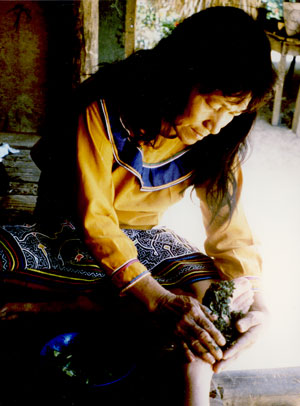
Women's Medicine
by Cathie Leavitt
"The Western perspective is that there are many plants in the rain forest to discover for our needs and interests. One of the most striking examples is how much the development and progress of medical science and the pharmaceutical industry has had to do with what has been learned from the world of plants and animals. Rather than perceiving what plants and animals have to teach us, the western perspective is typically framed in terms of investigation and acquisition of knowledge. In contrast, the concept of 'teacher plants' held by the people of the Amazon holds that the plants teach us directly by talking to us as a real person, as a teacher. Learning is then the result of a communication by the plant spirit or essence to the student/apprentice who has properly followed the diet. For this to happen the student must understand that he knows nothing, that he has come to learn and practice medicine/shamanic arts." - Didier Lacaze

Like my partner Carl (see "Reality? Don't Depend on It"), I felt called by some deep and ancient longing to visit the jungles of Peru and experience the plant medicine ayahuasca in its native context. There were two other women in the group, both a few years older than I. This is the story of one of them, whom I shall call Jane. During a group meeting before we departed from Pucallpa for the jungle, our guide was explaining the jungle program and the specifics of the diet and ritual, and he asked if group members had any questions or concerns. Jane raised her hand. She explained that she was in the early stages of menopause, and that her menstrual cycle had been somewhat erratic lately. She couldn't be sure, but there was a slight possibility that she might begin bleeding during our jungle journey. Would this cause a problem with regard to the diet, or were there any prohibitions against menstruating women being part of the healing sessions?
Our guide answered: "Well, the diet is very specific, and if you begin bleeding while we are on the diet, it means the diet is not effective. We would have to modify the diet for everyone in the group, if you think you are going to have a period during this time." This seemed to be an expression of a commonly held practice among Native American and other groups I was familiar with, that required menstruating women to refrain from participating in certain rituals and ceremonies during their moon time. Our guide explained that it was believed that during this time, the woman's energies would not harmonize with the energies of the plant teachers in some way.
There was a long silence as the impact of this announcement permeated the group. We realized that we were all connected and interdependent, and that the energetic condition of each one contributed to the experience of all. Many of us had come thousands of miles to experience a "real" ayahuasca healing, complete with the authentic diet, and suddenly it seemed that we might end up with a "modified" experience. I myself could empathize with Jane's dilemma, for I knew she didn't want to be responsible for holding back the group, and she certainly didn't want to stay behind in Pucallpa on the off-chance that her moon time would arrive.
Our guide spoke again. "It's possible that Amelia, our curandera, knows a way to stop your period with herbs. She herself took such a preparation years ago, and she has not bled since. I will tell her about your situation, and perhaps you can discuss it with her."
Jane agreed to meet with Amelia. She learned that there was an herbal medicine she could take that would stop her menstrual cycle...permanently! Now she was faced with a difficult decision. It would be no small matter to take the medicine, she knew. In a matter of a few days, it would take her across the threshold of menopause, a process that normally takes years to complete. Was she psychologically ready to make this transition? On the other hand, she knew that she and everyone in the group was counting on experiencing a powerful shamanic healing in the jungle, and she wanted nothing to stand in the way of that experience. In the end, she decided to take the medicine that would prevent her period.
As I watched this process unfold over several days in the jungle, I admired Jane's courage. The medicine consisted of several plants, mashed into a pulp, then thinned with lime juice, which Jane drank each day for three days while we were on the diet in the jungle. She said it didn't taste bad, but it made her nauseous at first. She had a couple of rough days. I could see that she might have underestimated the powerful effect this transition would have on her, but she stuck it out. She participated in all the ayahuasca sessions with us.
Three months after our return to the United States, I heard from Jane. She reported that she had not had a period yet, so apparently the medicine was effective. She wrote: "I still picture going up the birth canal [the river] on the way to the womb [the depths of the jungle], with her pulsating consciousness all around me, enveloping all my senses. This is what my body remembers, the heat of her energy, mother earth seeping into every pore of my body igniting it with a heat and passion for life."
The quintessential hot flash, I'd call it.
